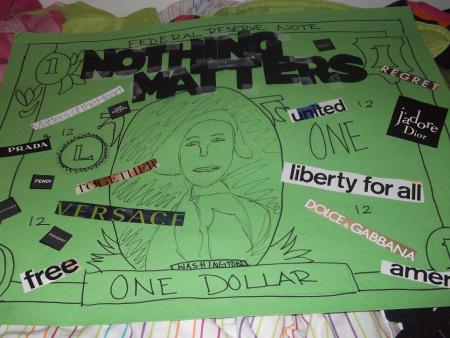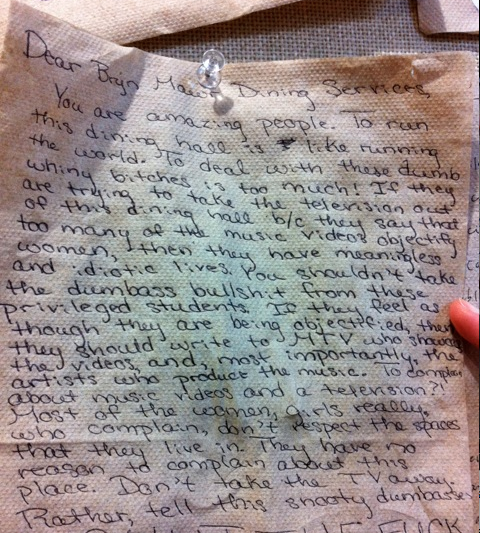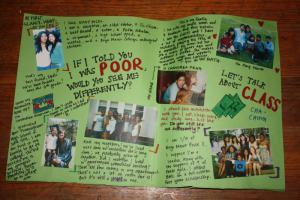Serendip is an independent site partnering with faculty at multiple colleges and universities around the world. Happy exploring!
In Class/OutClassed

Gender, Body Image, and (M)TV
Last Friday (December 9th) I posted an opinion piece on the napkin notes and MTVu discussion that’s been happening in Erdman Dining Hall for the past few weeks. When I wrote it, I knew it would be public – that was part of the assignment for our class. However, I didn’t realize how quickly it would spread to be a topic of discussion. Even as we speak the MTVu situation is growing more and more complicated.
On Wednesday night (December 14th), I spent three hours talking to some friends about gender, class, and different appreciations for body types based on race and culture. I can’t possibly capture everything that was said, but one aspect that I felt was very important to our discussions of objectification and the television was who is criticizing the TV’s presence, and why.


Paper 11
My piece is titled 'We All Live in a White Man's World' The color represents the different perceptions in the world. I could not find a canvas anywhere so I resorted to using paper. The white is suppose to represent the the upper class that shapes our society and controls what is 'proper' and what is not. I used a typewriter to create the words. The picture in the middle is the close up of the center of the piece. It reads 'see past the colored lens, look in their eyes' and I also put the single words a majority of us chosse in class, 'noise' and 'jail' because I thought they were not only great descriptions of class but of my piece connecting that the 'white man's world' is a jail and the perceptions are the noise. If I had a frame I would have framed it and hidden on the back is a clipped on 'Guide to Naming Your Class.' I spoofed on an old-aged article of who is who.

Class Matters, But It doesn't have to.
The Elephant in the Room
There are times on Bryn Mawr Campus where nothing seems to be taboo. Conversations can range from the mundane and boring to the deep and thoughtful even to the offensive and abnormal. Yet, the topic of class seems to be the most taboo of all. When class is mentioned, conversations are stalled and an awkward tension mounts. And when someone is asked about his or her class (which is a rarity in itself) a sudden wall is erected around them-- causing a barrier to form between the questioner and questioned. According to a survey done during the 2010-2011 school year , class is the most taboo subject at Bryn Mawr-- everyone is aware of it, can feel it, yet seldom wish to openly talk about it. And through this lack of conversation- this silence- frustrations mount and suddenly what could have been a simple conversation becomes confrontation. This silence was distilled during the Class Matters workshop, where class was the only topic to talk about. And with every word uttered during that workshop, the people who attended grew one step closer to figuring out, understanding, and accepting class. And even more so, I, who was supposed to be a hostess, a leader of the workshop learned quite a lot.


Classism v. Feminism and Why a Discussion About MTV Can Get Very Complicated Very Fast


“Dear Bryn Mawr College Dining Services,
You are all amazing people. To run this dining hall is like running the world. To deal with these dumb whiny bitches is too much! If they are trying to take the television out of the dining hall b/c they say that too many of the music videos objectify women, then they have meaningless and idiotic lives. You shouldn’t take the dumbass bullshit from these privileged students. If they feel as though they are being objectified, they should write to MTV who shows the videos and, most importantly, the artists who produce the music. To complain about music videos and a television?! Most of the women, girls really, who complain, don’t respect the spaces that they live in. They have no reason to complain about this place. Don’t take the TV away. Rather, tell the snooty dumbasses to SHUT THE FUCK UP! YOU DON’T KNOW WHAT REAL OBJECTIFICATION IS!!!
Sincerely,
c/o 2015
POSSE SCHOLAR”
Confused? I was too.
Actually, my range of emotions went from bewildered to outrage to confusion to (perhaps?) understanding and finally frustration. But in order to get to that, you should know my story.

If I Told You I Was Poor, Would You See Me Differently?

This is a poster-collage that I did last night. I was pleased yet frightened with the finished project and I ended up running to my posse. They were really proud of me and wanted to do their own version of the poster-collage. I was inspired by Marian's zine and I remember being so amused with it because I could relate on so many levels - except that instead of being a millionaire, I decided to declare that I was FAR from that. I think I've always kept my socioeconomic status as a secret in high school and now that I'm in college, I'm deciding to own up to my status, just like Marian did. I'm actually thinking of posting it outside of my dorm because I don't know what else to do with it. But I don't know how the people on my hall will react or if they will react at all. I kept the class workshop in mind because we discussed broadening the audience when it came to talking about class. And my audience is the Bryn Mawr community as a whole.
I had to resize the image (you could initially read it) so I will copy down what the text says on the poster.
On the bottom left, next to the picture of me and my little brother it says: "I graduated from Framingham High School in June 2011. I am the first in my family to go to college. The kid next to me is my youngest brother, Aaron. Hopefully, he'll go to college too."
Fears and Realizations: A letter to no one and everyone
December 9, 2011
Dear Reader,
I used to want to be a pompous asshole. Really. I wanted to walk around New York City in a pair of six-inch stilettos wearing classy suits knowing that I was the boss of everyone and had a beautiful lofty apartment to go home to. And in the back of my mind, I wonder if maybe that’s why I chose Bryn Mawr, because it was the fastest way to get to “superior” status.
And then I came to Bryn Mawr and realized that I didn’t actually want to be a corporate, façade of a woman. But that’s part of what Bryn Mawr does; it creates empowered women. I’m fearful that Bryn Mawr will rub off on me, and empower me too much. I don’t want Bryn Mawr to shape me into a woman who feels like she can only change the world by being in a position of power. I don’t want to be a lawyer or a doctor or a politician if I’m only doing it because that’s the career path Bryn Mawr women choose. I am afraid of becoming so empowered by a notion of a Bryn Mawr education that I lose the raw emotion of compassion and love, the real qualities that empower a person.




